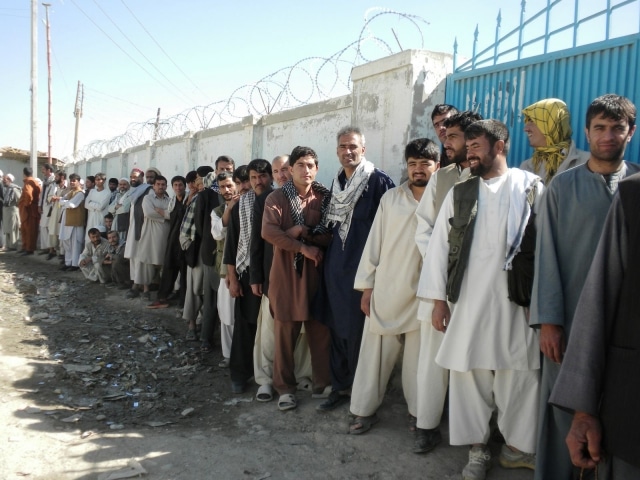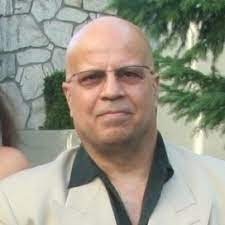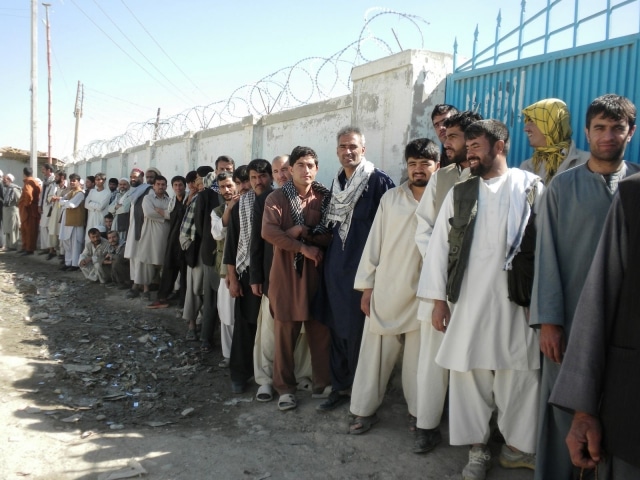How to Find Qualified Afghan Leadership
By Khalil Nouri, Editor
As 2014 approaches and NATO prepares to leave Afghanistan while the Afghan presidential election begins to activate, there are a set of indigenous conditions that must set the standard for the effective transfer of power to qualified Afghan leadership that cannot be ignored any longer by policy makers.

“A leader is one who knows the way, goes the way, and shows the way” and “A great leader’s courage to fulfill his vision comes from passion, not position”, John C. Maxwell (1971).
Since the U.S. invasion of Afghanistan in 2001 those qualities have been in short supply for the country. Sadly it has lacked a true leader to steer the Afghan nation towards the only path that would lead to a unified and progressive Afghanistan, as it once was. After 11 years the same fruitless trend of U.S. support for illegitimate and dishonest leadership in Kabul is perpetuating a dysfunctional scheme that is incapable of self-correction. It is a fact that the historically acceptable indigenous method that worked in the past to appease and unify the Afghan majority has been continually ignored. This is a dangerous recipe for a bloody civil war with monumental unintended consequences for the region and the world.
The consistent lack of high level involvement by key Afghan players in promoting a peaceful solution for all Afghans will result in an erratic outcome. Policy makers do not recognize how to solve this problem because they look to the U.S. sponsored Afghan elites in Kabul who cling to their dishonestly acquired power, claiming they have the rights to dynastic leadership.
But so far, the true indigenous formula to “fit, form and function” an Afghan leadership has never been given a chance.
Evidently Afghanistan’s Jeffersonian style democracy has been co-opted by an illegitimate and futile presidential election with the assist of enormous amounts of wealth, force and intimidation.
These are the preferred and acceptable means to secure fraudulent votes resulting in a destabilizing crisis for the country that is beyond repair.
The transfer of power from NATO to the Afghan government will be an illusion if the country’s leadership does not support the interests of the majority. The list of indigenous measures below lays out those requirements for an Afghan leadership that could create unity and trust amongst all the Afghan people once again.
First: The leader should not have blood on his hands.
Second: The leader should have a bloodline identity and tribal backing.
In tribal Afghanistan, bloodline identity is the most essential aspect of the society, it carries the generational deed so the Afghan majority could give its best and clear assessment whether to trust or distrust the leader. Unlike western system, primitive Afghanistan does not have a digital bar code method so one’s archival data is freely be a matter of public record.
Third: The leader should not be corrupt and dishonest else he will not gain the majority’s allegiance.
Fourth: The leader should convey the true vision of mainstream Islam and not radicalized ideology for political and personal gain.
Fifth: The leader should be acceptable to any other ethnicity when crossing that ethnic line.
Sixth: The leader should avoid impartiality and nepotism by NOT elevating his tribe or ethnicity.
Once there is an effective leadership in place, they should be supported by an effective enough structure of governance to win sufficient popular support. In addition, there needs to be enough money to keep the economy and the government running. Similarly, there needs to be a functional security presence in key populations’ centers. In addition, the Afghan government and the international community should agree with continued U.S. and allied presence during the transition and for as many years necessary after 2014.
Perhaps time is short in implementing this concept but something of this nature must be done immediately before it is too late for the Afghan political system to hold free and fair elections—especially presidential elections.
Charges of electoral fraud make matters worse. This has a direct bearing on the security situation affecting the current political system as to whether it will survive the 2014 NATO drawdown.
Khalil Nouri is a member of NWSC (New World Strategies Coalition) a think tank founded by native Afghans that creates nonmilitary solutions for Afghanistan. The NWSC has outlined a comprehensive reconciliation process in a white paper entitled Restoring the Tribal Balance. Afghanistan National Reconciliation: Facebook
Khalil is also the author of two upcoming books, “Shattered Dreams” and “Seeds of Unity”

Khalil Nouri was born in an Afghan political family. His father, uncles, and cousins were all career diplomats in the Afghan government. His father was also amongst the very first in 1944 to open and work in the Afghan Embassy in Washington D.C., and subsequently his diplomatic career was in Moscow, Pakistan, London and Indonesia. Throughout all this time, since 1960’s, Khalil grew to be exposed in Afghan politics and foreign policy. During the past 35 years he has been closely following the dreadful situation in Afghanistan. His years of self- contemplation of complex Afghan political strife and also his recognized tribal roots gave him the upper edge to understand the exact symptoms of the grim situation in Afghanistan. In that regards, he sees himself being part of the solution for a stable and a prosperous Afghanistan, similar to the one he once knew. One of his major duties at the beginning of Operation Enduring Freedom in Afghanistan in 2002 was advisory role to LTG Franklin Hegenbeck. He has worked closely with the Afghan tribes and his tribal exposure is well tailored for unobstructed cross-cultural boundaries within all Afghan ethnicities. He takes pride in his family lineage specifically with the last name “Nouri” surnamed from his great-grandfather “Nour Mohammad Khan” uncle to King Nader-Shah and governor of Kandahar in 1830, who signed the British defeat and exit conformity leaving the last Afghan territory in second Anglo-Afghan war. Khalil is a guest columnist for Seattle Times, McClatchy News Tribune, Laguna Journal, Canada Free Press, Salem News, Opinion Maker and a staff writer for Veterans Today. He is the cofounder of NWSC Inc. (New World Strategies Coalition Inc.) a center for Integrative-Studies and a center for Integrative-Action that consists of 24- nonmilitary solution for Afghanistan. The function of the Integrative-Studies division (a native Afghan think tank) is to create ideas and then evolve them into concepts that can be turned over to the Integrative-Action division for implementation. Khalil has been a Boeing Engineer in Commercial Airplane Group since 1990, he moved to the United States in 1974. He has a Bachelor of Science degree in Mechanical Engineering, and currently enrolled in Masters of Science program in Diplomacy / Foreign Policy.
ATTENTION READERS
We See The World From All Sides and Want YOU To Be Fully InformedIn fact, intentional disinformation is a disgraceful scourge in media today. So to assuage any possible errant incorrect information posted herein, we strongly encourage you to seek corroboration from other non-VT sources before forming an educated opinion.
About VT - Policies & Disclosures - Comment Policy




